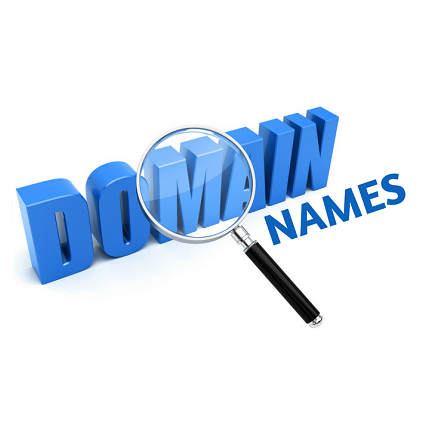The process of making a great website ready starts with choosing the best domain name for your business / website. This is something you need to think about and plan for. Without a good domain, even a well developed and designed website may not get great traffic and conversions.
Choosing the right domain name is pretty important for your brands’ success too. Its way more difficult changing a domain name later – once the website and brand is established. Changing a domain name later impacts SEO, branding, Social media mentions and may create confusion in the mind of your audience.
So it’s better to get your domain name right the first time!
With that in mind, lets look at the tools, tips, factors you need to keep in mind when choosing your website’s domain name.
First, Some questions to ask yourself when choosing a domain name for your website
1. Who are my users and what is their primary language ?
2. Do I already have a brand presence or keyword, business name I am known by ?
3. Should I go for a domain name with .com or specific to my country (like .in , co.uk, .ca)?
4. How big or small should my domain name be ?
5. What kind of domain names are my competitors using ?
6. Will my domain name impact my future growth (proposed product lines etc.) in any way ?
Now while you have these questions and thoughts written somewhere or at-least at the back of your mind – let us list down some steps / tips to help you choose the best domain name for your website. We’re providing 20 of these here. I summarize them as below:
1. .com Works best in most cases
2. Using keywords in your domain name
3. Keeping your domain name short and simple
4. Choose a domain name that is easy to pronounce or spell
5. Choosing a domain name for a Blog – Keep it broad
6. Choosing a domain name for a Blog – Broad yet Niche related
7. Branding and Uniqueness
8. Checking competitors and similar versions to your domain
9. Shortlist and finalize domain name after discussion with colleagues
10. Avoid Hyphens , Doubled letters etc. in your domain
11. Use tools and Domain name generators to get ideas
12. Using an expired domain name which fits your needs
13. Legal considerations when choosing a domain name
14. Buying other .tld versions of your domain name
15. Checking an existing domain history before buying
16. Checking an existing domain ranking factors before buying
17. Special considerations when choosing an ecommerce related domain name
18. Checking and creating social media handles for your domain name
19. Don’t Delay on registering the domain Once decided. And where to get it.
20. Keeping your Domain control panel and credentials safe
Now let’s go through all of these in detail.
1. Why .com works best for domains in most cases
The .com domain name extension works best in most cases. This is because of the following simple reasons:
a) .com is most familiar and the default top level domain (tld) extension which comes to mind which people may type into the address bar
b) Imagine telling someone your business is xyz.co.in , xyz.biz or xyz.ca. Very likely he or she may forget the extension and just go with xyz.com . Sure you will still be found thanks for google search but isn’t it better to be remembered than searched for.
c) .com implies a global appeal while still allowing for the business to serve locally. If you have a business queenswear.com , it gives a far better impression when tomorrow you decide to sell globally than if it was say queenswear.co.uk or queenswear.com.au.
d) But i do say that .com works in ‘most cases’ . For example, If your focus for the near or medium foreseeable future is likely to be a specific country, you may wish to register a domain name with that tld.
As an example, an immigration consultant who specializes for Canada and intends to keep it that way may wish to register a domain under xyzcanadaimmigration.ca vs. xyzcanadaimmigration.com .
2. Using keywords in your domain name
Using Keywords in your domain is a pretty good idea. Yes, there are other considerations such as to whether your brand name itself is quite well known, or whether the product or services are more well known. But using your niche or sector specific keywords can be helpful especially for blogs, authority websites.
Keep in mind that the impact of using keywords in domain name from point of view of SEO has REDUCED and is minimal. So it shouldn’t be the biggest consideration. For example: if using keywords gives a very commercial, non unique feel to your domain ,and also makes it bigger and harder to remember – than that is avoidable.
You certainly should not try and stuff keywords in it.
Examples of some natural, catchy keyword based domain name include: wpbeginner.com , techradar.com, androidauthority.com , techadvisor.co.uk.
On the other hand if you are business who wishes to build their own brand and have products or services closely tied with your brand, you should simply check first if your brand name is available for domain. Do keep in mind that most of the time brand considerations will overrule the keyword considerations especially since Search Engines no longer give significant weight-age to this keyword factor.
3. Keeping your domain name short
As discussed in point no. 2, sometimes trying to add keywords or niche related words only makes the domain name clumsy and unnaturally long. This should be avoided. Whether choosing an alternative name or a brand based domain name, a short domain name will be better.
But as you may well have realized, finding a short , simple, meaningful domain is not very easy today. Most of them are already booked. Most of the two-three keyword variation domain names which are short and sweet have already been registered. On the other hand, you may still be able to register domain name after your unique brand name.
Most of the domain registration providers have name generated suggestions & options. Another way to get good options for your domain name is through name generators. You can jump to this section to know more about Name Generator Tools.
According to research from DataGenetics.com, a blog by Nick Berry, the most common length of a domain name is 12 characters. Have a look at this distribution below:
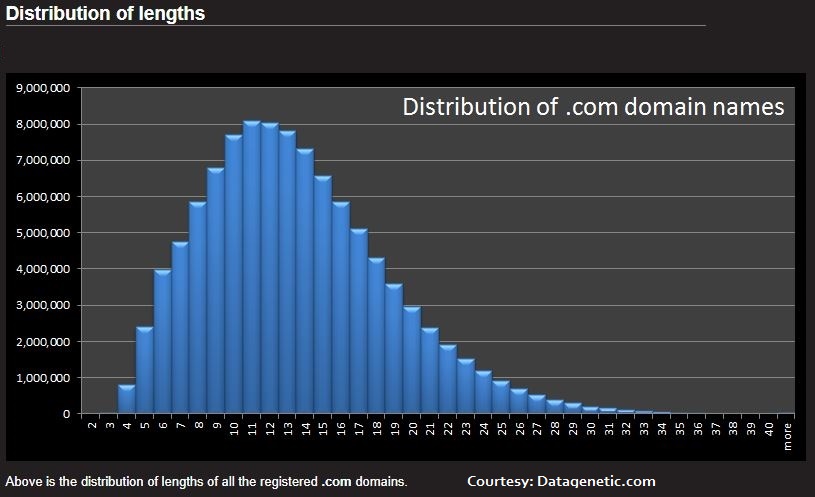
4. Choose a domain name that is easy to pronounce or spell

This is intuitive but many of us get this wrong. Imagine you’re telling a potential customer, your domain name over a call and they have trouble writing it down. Or miss-spell it when typing in browser to check out your website. As Jason Calacanis, the serial entrepreneur and angel investor behind tech giants like Uber, puts it: “If you have to spell it over the phone, you’ve lost.” And yes, if it can be short and sweet, all the better. The World Wildlife Fund went for wwf.org and not a much bigger domain.
Sometimes domain names can conjure up funny and even some unfortunate double meanings. Sample the following, for example:
- www.therapist.com
- www.whorepresents.com (they were aiming for WHO Represents)
- www.Speedofart.com (they wanted to say Speed OF ART and not the other one)
- www.Penisland.net (nope, its not what you think – Pen Island is a company)
In a nutshell, avoid a domain name which may have unnecessary ‘s’es, is difficult to spell or unpronounceable.
5. Choosing a domain name for a Blog – Broad or Narrow
From the above points, it becomes clear that blogs, authority sites have different considerations when choosing of their domain name. A keyword or keyphrase which signifies the niche of that website should be used for the domain. Example of popular blog / authority sites which’ve made use of this principle include 9to5mac.com , businessinsider.com , webmd.com , searchenginejournal.com , coindesk.com . When choosing such keyphrases, one question you may want to ask yourself – is your name sufficiently ‘broad’ to allow for future expansion. For example: Imagine if someone had started a blog related to seo as altavistajournal instead of searchenginejournal, or 4ktvreviews.com instead of gadgetreviews.com (when later realizing he wanted to write about other gadgets as well).
Conversely, if you want to focus on a specific niche you can keep the domain name focused on it. It all depends on your future goals and how you visualize your blog to grow. Just keep your long term vision in mind.
6. Choosing a domain name for a Blog – Broad yet Niche related
Following up from above, when choosing the domain name for your blog, by all means consider the possibility of expansion in future, but still try and be related to the niche. And this does not mean just looking at keywords etc. For example, makingsenseofcents.com is a well known blog related to managing personal finances etc. Not full of keywords but instinctively indicates personal finance in connected sort of way through the domain. Similarly, consider another blog : thepointsguy.com , a well known blog related to travel, hotel etc. reward points and deals – it has a catchy, memorable domain name, which again is not keyword filled but gives some indication as to what the blog may be about.
7. Branding and Uniqueness
As you may have guessed by now, there are two ways of naming the domain – a) Go with a brand based or unique domain name b) Go with a keyword derivative or niche related domain name. We’ve already talked about the pros and cons of keyword based domain name. Lets look at the advantage of a brand based domain name now:
- Its likely to be unique, named after your company or key brand.
- Its will probably be easy to memorize — not too wordy, no complex vowel combinations.
- Easy to pronounce
- May sound more trustworthy and not keyword stuffed
Examples abound of brand based domain names ranging from airbnb.com, amazon.com, pepperfry.com etc. Always remember – when the brand, named product or service is the key for the business, forget keywords etc. and just go for a domain name based on that brand, product or service.
8. Checking competitors and similar versions to your domain
It’s always a good idea to check your competitors as to what domain names they’re using. For one thing you want to avoid a domain name too similar to theirs, for another you can get some good ideas to brainstorm. Some of the competition may be using their own brand name in the domain which’d obviously be unique. In other cases, such as for blogs etc. you may get some inspiration from what names people have used for blogs in your niche and what you need to do, to stand out from the crowd.
9. Shortlist and finalize domain name after discussion with colleagues
Once you’ve shortlisted some domain names, the next step should be to discuss, sound them out with colleagues and stakeholders. Their response and perspective can help you make a sound decision as to which domain name sounds best, is easy to pronounce, easy to remember and spell and identify with the brand.
10. Avoid Hyphens , Doubled letters etc. in your domain
We’ve talked about easy to pronounce, easy to spell and short and sweet domain names earlier. Another important tip is to avoid domain names with hyphen. For example, a domain name such as web-hosting-reviews.com may have a great match for keywords but the hyphens make it an eyesore and quite difficult to remember. Almost anyone will type this domain without hyphens when mentioned to them. It also looks quite spammy. Tomorrow if anyone was to get the exact match domain variant (webhostingreviews.com ), or that suddenly became active, you’d lose even the little credibility that your version may have built. For that matter, even exact match domains (EMD’s) are not a very good idea because they look like spammy and keyword stuffed.
11. Use tools and Domain name generators to get ideas
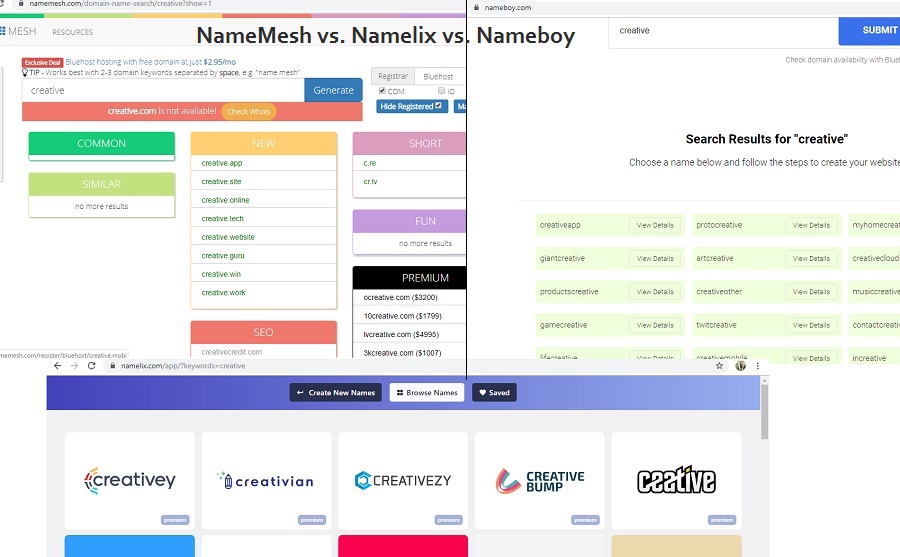
There are millions of domain names being registered every year and it is getting harder and harder to find meaningful, catchy domain names. Tools and domain name generators can change that and help you with your search for finding the perfect domain name. There are many tools but we’ll list 3 of the really cool ones here:
a) NameBoy.com : A good option to generate based on keywords. Provides Quick and uncluttered results
b) LeanDomainSearch.com : We’ve picked this one because it delivers a lot of results (in thousands) very quickly based on the keywords (or a keyphrase) you type. And you can filter them based on length, popularity , alphabetical. Namemesh is also good but we really found the way it presents the results as a bit distracting and too commercial.
c) Namelix.com : Provides for brandable domain names and ideas based on a keyword with all sort of keyword and non keyword based combinations. Awesome UI. Allows us to choose name length, name type (brandable, keyword based, compound word etc.)
So do generate some options with name generators like these and then shortlist them considering all the tips, suggestions listed here.
12. Using an expired domain name which fits your needs
An expired domain name is one which was registered and under ownership at some point of time, but was not renewed by the owner and is now available. The registrar of the domain name generally makes it available for purchase typically by bidding and then it can be transferred on your name. Godaddy runs a pretty organized Expired domain registration system where you can purchase all types of expired domain names.
13. Legal considerations when choosing a domain name
Choosing a domain name also has legal ramifications. If you purchase a brand based domain name which is similar to a domain name or established brand already registered, or already trademarked, there may be future legal issues. It is always wise to do a trademark search , also check similar variations of the domain name and see if any established brand is using it. For example , lets say the domain name therealgoogle.com is available, would you be able to register it without risking an immediate lawsuit ? Most likely no.
Not only trademarked brand names, copyrighted expressions also run the risk of attracting litigation if registered for domain names. Similarly assuming yours is an established registered brand and you find someone is already using a domain name variation of your brand, you may want to take legal advice to protect your rights. This is another reason why registering tld variations of your domain name may be a good idea.
14. Buying other .tld versions of your domain name
Your website will always be linked to the primary domain name but you should consider buying the other tld’s (top level domain) versions of your primary domain name.
For example if you have registered: Seemyblog.com , you may wish to consider getting: seemyblog.in, seemyblog.net. Yes, it’ll add a little bit to your annual charges but it does protect your brand and domain from copycats, squatters, impostors. Now this may not happen immediately but can be a bother some time down the line if your site becomes really popular and known by its brand. Someone may try and buy a tld and even sell you at a higher price, or try and impersonate your brand. So even if you don’t buy other tld’s immediately on starting up, think about doing so when your company or brand starts to do well. You can then redirect these tld’s to the main domain name.
15. Checking an existing domain history before buying
One possible way to buy a domain is to buy expired or existing domains which are available on the market. Now these are domains that have been held earlier and may even have had a website running on them. Due to some reason or the other, they are expired now and on the market.
Why would it make sense to buy such a domain, you ask ?
Such older domains carry history and some ‘authority’ with them. As the basics of SEO tells us, the more the authority of a website, the easier it is for it to rank for relevant keywords. Authority is built by many, many factors including age, no. of links, quality of links, social mentions etc. to a domain. Therefore the authority and trust of a domain name is likely to go up with age.
But this may not always be the case. So if you’re wanting to buy and existing domain, check out its history such as Spam Score, Kind of Links it has received, Traffic etc. For instance, if the domain name has gone through google penalties or was promoting spam, porn or other such products, you will really find it difficult to rank such a domain name.
You can find out about this using tools such as Moz Link Explorer , and even reverse google search typing site:YOURDOMAIN.com. Here is a list of all such methods to check history of an existing domain name before purchasing:
1. Check pages indexed in google as explained above
2. Check using tools like Moz LinkExplorer and Majestic SiteExplorer
3. Check actual pages ranked and indexed using Wayback Machine website
4. Check through who.is
16. Checking an existing domain’s ranking factors before buying
Let’s assume you are looking at buying an existing domain. This can be through godaddy, various other auction sites, or expired domain name searches. These will not be as cheap as new domain names and you may very well have to bid for them or pay a premium price to have them transferred in your name. In SEO there are 3-4 key metrics which can be used to determine how much authority a domain has. As we’ve discussed, more authority and trust a domain has, the easier it will be for it to rank on google for specific keywords. These metrics are Domain Authority, Citation Flow, Trust Flow. It is beyond the scope of this article to explain these in details but domains with good domain authority and good Citation Flow and Trust flow do rank well. Whereas a new domain begins with zero on these parameters , expired domains may have good DA, CF, TA. Traffic is an important consideration as well.
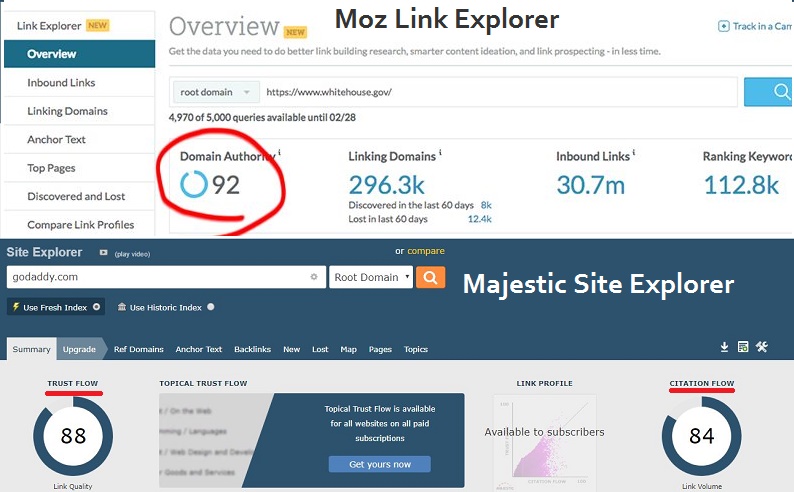
Typical values above 25 for Domain Authority, above 15 for TF / CF can be helpful towards SEO. Another factor to look at is whether the domain is already getting traffic and what kind of links it has. Based on these parameters you can decide whether the price being asked for the domain makes it worthwhile.
Bear in mind that Domain valuation is a complex subject and unless you are very knowledgeable about SEO, etc. we would not advise that you pay large amounts to acquire expired domain names.
17. Special considerations when choosing an ecommerce related domain name
Assume that you are starting a new business centered around e-commerce and a domain name and website is the key to the business. E-commerce is a tricky business and there are thousands and thousands of websites coming up every day promoting one product or the other. The key to the e-commerce business is getting traffic and conversions to your website and building a brand. And therefore your domain name should speak of a brand, should be easy to remember, unique, identifiable, sound trustworthy. The biggest e-commerce website for example has a domain name that is so easy and memorable: amazon.com. Asia’s biggest e-commerce sites such as alibaba.com, flipkart.com, snapdeal.com – compound word domain names but still short and sweet and easy to remember. I personally wouldn’t go for larger than a two word domain for an e-commerce website.
18. Checking and creating social media handles for your domain name
Another check you may want to do when registering your domain name is whether your domain related social handles exist or are taken up. Although not a prime consideration, but still if a Facebook page with same name as your domain name, already exists – you may want to check it out and see if any further legal checks such as trademark etc. checks are required. Conversely if you already have very successful social handles such as FB page or Instagram account, and are now registering the domain – you may want to keep a similar domain name to that handle to take advantage of the branding. Obviously these are not the biggest considerations, but something just to think about when registering your domain name.
19. Don’t Delay on registering the domain Once decided. And where to get it.
This may seem an obvious tip but once you’ve reached a decision on which domain name(s) to register – do NOT delay. Someone in some other corner of the world may well be thinking of registering the same domain name! He or she may even have a different idea or business, but its quite possible they may want the exact same domain. So, immediately register the domain once decided. After all, it only costs a small amount typically between $10-$20.
So where should you register your domain name, now that you are ready. Here we provide you 3 reputable domain name registration options mainly based on the ease of use, features, reliability and pricing.
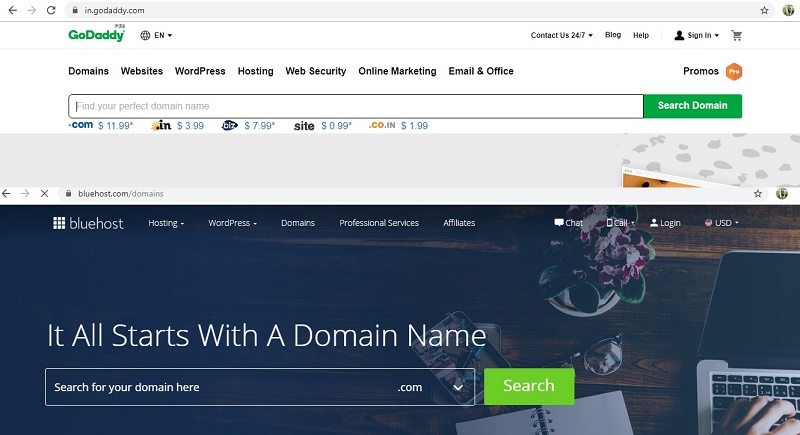
1. Godaddy: Yes godaddy is the bigdaddy of them all , with good offers of .com domain name registration as well as free email, additional offer on websites. My only peeve with Godaddy is that I find their interface a bit obscure when it comes to managing the domain name.
2. Bluehost.com : This is one of the biggest hosting companies and provides domain name , website hosting, email etc. Use our link to get great deals on Hosting and/or free domain name. 
3. Namecheap.com : Also one of the larger and better domain name registration companies with easy options, reasonable prices.
Bear in mind also that many hosting providers – such as Bluehost, Hostgator etc. have hosting plans where the first year domain name is provided FREE OF CHARGE. The only catch being that you’ve to commit to a hosting plan. However, don’t let this delay you from registering a domain name immediately after it’s been decided upon.
20. Keeping your Domain control panel and credentials safe
Now that you’ve registered your domain name, you will get an email with the invoice, other details and very importantly, login credentials for your domain control panel. These credentials are important if you ever want to change your registration details – such as email, address etc. and nameservers. Nameservers are basically servers which associate the domain name with physical ip address , server on where your website files will be placed. When you are hosting, you may need to change the default name servers to that of the hosting provider. Even at a later stage, you may require these details. So keep these safe with you.
You may also get a ‘Verification Email’ to confirm your contact details on registering of the domain. Please make sure to confirm ownership there otherwise the registrar may suspend your domain.
Got all you needed to know about choosing your domain name ? Great Stuff 🙂 And you can write to us for a Free Consultation and Guide on Creating a website which will help achieve your business objective.
